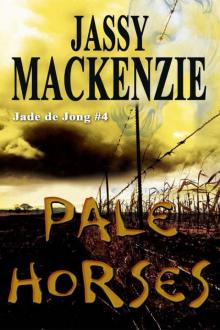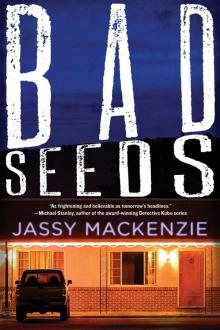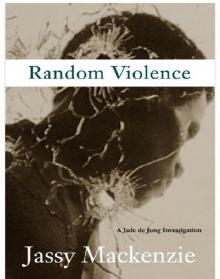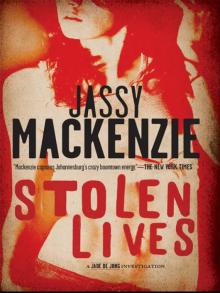- Home
- Jassy Mackenzie
Stolen Lives Page 6
Stolen Lives Read online
Page 6
“Baas!” Moffat’s voice was loud and insistent. At the same time, he heard a harsh, barking cough from the other side of the counter.
Garry heaved himself upright, catching the stool with his knee and sending it clattering to the floor. He’d expected to see the big coloured man there, but he was wrong.
The dark-suited gentleman was standing by the counter, leaning over it and examining the contents.
Rattled that the man had got so close without him noticing, Garry drew himself up to his full height of six foot three, and faced the smartly dressed man.
“Help you?” he asked.
Close up, the man was older than he thought. In his fifties or sixties, Garry guessed. His dark skin was dull, with a greyish tinge, and deep lines carved their way from his surprisingly aquiline nose to his full lips. The joints of his fingers, gripping the head of the walking stick, looked swollen and sore.
“Yes, please.” The man spoke softly, dropping his gaze to the display under the glass counter.
That was where the knives were kept. A selection of about twenty, ranging from short to long, from smooth to cruelly serrated, all with their blades uncovered. Unusually for stock in a pawnshop, Garry’s knives were always brand-new. In the entire history of Cash Is King, nobody had brought one in to sell secondhand. He got them straight from the manufacturers—ends-ofranges, old stock, surplus items.
Garry didn’t feel good about the knives, but he didn’t feel bad either. They were just something he sold, like the secret stash of hard-core porn movies that he showed to only a few selected customers.
In the display there were a few fire department rescue knives, with their dark steel fold-away blades flipped outwards, and a couple of ak-47 fixed-bayonet knives. These were displayed out of their leather pouches, with broad, smooth six-inch blades and a button to hook them up to the rifle, should anyone who bought one possess such a weapon and wish to attach a knife to it.
But it wasn’t those that the man was staring at.
He was looking at the four traditional Scottish sgian dubhs that Garry had noticed while shopping in Edinburgh a few years ago after travelling there for a friend’s wedding. He’d bought six, kept two for his own collection, and put the other four in the shop. And at a hefty price, which was why they hadn’t attracted much interest. Up until now, that is.
The short knives had plain black handles—he’d learned that the words “sgian dubh” actually meant “black knife”—and short, wickedly sharp spear-point blades forged from Damascus steel. When he first saw them, they had lain next to their simple sheaths, the same way that they were displayed now.
It had taken Garry a few tries to get the pronunciation right when he asked what the knives were called. The closest he’d been able to get was “ski-and-do”.
“In the old days they were secret weapons,” the buxom Scottish shop assistant had explained to him in her delightful accent, hooking her thick, copper-coloured hair behind her ears. “They’re small, see, so they could be carried hidden. That way, if you had one, you’d have the element of surprise in a fight.”
“The aily-ment of surprise, hey?” Garry had grinned at her, mimicking her accent, and she’d giggled and blushed. He’d bought the knives, asked her out that night, and taken her along to the wedding with him the following day. What had her name been? Morgan? Morag? Something like that. They’d lost touch soon after his return to South Africa, but looking at the knives always reminded him of that Scottish salesgirl.
“May I see one of those, please?” The black man was pointing to the sgian dubhs. Garry noticed that his fingertip did not quite touch the glass. Respect. Older guys had it. It made a welcome change from the youngsters, usually rough types who flattened their entire palms over the counter and peered inside, bending so close that their breath steamed up the glass, leaving greasy smudges and sweaty finger-marks behind them.
“Ja, sure.” He unlocked the display cabinet, reached inside, and placed one of the knives on the counter. He stepped back, just in case the man was going to try anything funny with it, but he wasn’t overly concerned. After all, they weren’t throwing knives, and his gun was within easy reach.
But the man simply took it and, holding it in his palm, ran the back of one of his swollen knuckles gently down the blade. Then, as if reaching a decision, he nodded once and closed his fingers around the handle.
“I’ll take them.”
“Them? You mean …?”
“All four, please.”
“They’re a thousand rand each, my friend,” Garry said, in the particular accent he always used when dealing with black customers. “You sure you got the money for that? Cash only, hey.”
The man reached into his jacket pocket and produced a bulky white envelope. He opened it, and offered it to Garry in the same way that a friend might have offered him a piece of biltong from an open packet. Inside the envelope, Garry could see a thick wad of two-hundred-rand notes.
“Please, take your money.”
Surprised, Garry took the envelope. The man wasn’t a local— he could tell that from his accent—but he sounded well educated. He could surely count twenty notes off a stack without help.
Perhaps those swollen knuckles would make the job too painful; although Garry’s old man had worse arthritis than that, and he could still shuffle and deal a pack of cards like a croupier.
Garry counted out the notes, examining them carefully, holding each one under the uv light on his desk to check its authenticity. They looked genuine enough as far as he could tell. Genuine enough, at any rate, to be spent by him again.
When dealing with customers like these, Garry’s standard policy was to short-change. Hell, why not? Especially seeing there was way more than four grand in the envelope that the man had so unsuspectingly handed over. Garry guesstimated that it contained over six thousand rand. He had nothing to lose and everything to gain. Just let his fingernail hook a bunch of notes all at once, and add a little onto his own personal Christmas bonus. Money that he would not have to declare to the taxman, or to his business partner, who was away today doing a stocktake at their other shop in Jo’burg city.
He glanced up furtively, but his customer wasn’t watching. He had his head turned away, and was looking around the shop.
Garry’s right index fingernail snagged the extra notes easily, but then he hesitated.
He had a pretty strong sense of self-preservation—a must for any guy running a successful pawnshop in this area—and his instincts were starting to scream at him that, perhaps, doing this wasn’t a good idea.
Perhaps, in fact, it was a very bad idea.
It was all too easy. Was this some kind of test?
Garry lifted his finger and the little bunch of notes riffled back into the stack. He carried on counting out the notes, and when he had reached the exact amount, he handed the envelope back to his customer.
Then Garry put the other three knives and their sheaths into a white plastic bag and pushed it across the counter, noticing that the man didn’t add the fourth knife to it. While Garry had been packing the other three up, he must have done something with it. Garry had no idea what. All he knew was that the knife was no longer visible.
“Anything else?” he asked.
The man paused for a moment. Then he beckoned Garry closer.
The action was suspicious, particularly given the mysterious disappearance of that knife. Garry didn’t want to feel that blade pressing against his throat, didn’t want to have to comply with a hissed request to give that cash right back again, thank you.
Garry leaned partway across the counter, keeping his gaze fixed on the older man’s hands.
“I heard you can organise South African passports,” he whispered. Close up, his breath smelled sour.
Garry had just closed his hand around the grip of the Colt.45 he kept under the counter as a precautionary measure. The words caused him to recoil. He dropped the weapon back on the shelf. What the hell? Was this guy a co
p?
“What’s all this about?” He raised his voice, glowering down at the man.
Unperturbed, the black man beckoned him in again, speaking softly.
“I am asking you only because one of your customers told me you do it.”
Garry blinked rapidly.
The man was right. He had organised docs for various people, including a couple of regular customers, a number of times in the past. For a while it had been a thriving sideline. But it had become too dangerous. He’d almost walked into a police trap last Christmas, and after that he’d decided it wasn’t worth the risk. In any case, his connection in Home Affairs had recently retired.
“I don’t do that anymore,” he muttered.
“I can pay. Whatever it will take.”
Garry considered his options for a moment.
A while back, he’d heard that a woman had set up shop somewhere in Pretoria, specialising in the procurement of South African documents. One of his old customers had told him about her. In fact, Garry had even taken her details down, but after the Christmas situation, had never used them.
Perhaps he should take the money the black man seemed so willing to invest and contact her now.
Or perhaps not.
An elegant solution to his dilemma suddenly occurred to Garry.
“If you want to pay, you can buy a phone number from me. Hand over the rest of the money in that envelope, and I’ll give it to you.”
The man twisted away from Garry and coughed again, his shoulders hunched. The noise was rough and rasping and sounded like it hurt.
Then, turning back, he shook the last sheaf of notes from the envelope onto the glass counter.
Garry scribbled the lady’s details down on a sheet torn from his spiral notebook.
“Thank you,” the man said, as he pocketed the paper. Then, once again, he leaned closer.
“You have done me a favour. So I will do one for you, too.”
“What?” Garry snapped. He had been hoping the old gogo would go away now.
“You need to watch out,” the man whispered. “One of your customers is armed.”
“What the hell?”
Then Garry’s head snapped up as he realised that the coloured man had moved closer to the other end of the counter and was fumbling for something under his faded shirt.
“Moffat!” he yelled.
His assistant dropped the duster he was holding. He glanced over at Garry and then, reading the situation instantly, dashed towards the coloured man.
“Hands up! Drop it!” Garry shouted.
Jesus Christ, the bastard had the gun out already, and now he was pushing Moffat aside, sprinting forward, and aiming it at him. He realised in an adrenaline-fuelled instant that it looked like an old police-issue z88 and leaped sideways, but caught his foot on the fallen stool.
He crashed onto the tiled floor, whacking his head hard against the back wall. The z88 fired with a deafening bang, and the bullet smacked into the wall above him.
Breathing hard, Garry crawled to the edge of the counter, his vision temporarily dulled, his mouth filled with a bitterness he would later realise was the acid tang of fear.
He reached up and scrabbled around for his own gun, but his fingers couldn’t find it anywhere on the shelf.
“Baas!” Moffat’s panicked voice distracted him. His assistant had grabbed the coloured guy from behind, pulling his gun arm out to the side, but the man was struggling hard. He twisted and turned his wrist, somehow managing to angle the z88’s barrel round towards Garry.
Garry scrambled to his feet and hurled himself round the counter, but he was too slow; he had reacted too late. He was still a few feet away when his assailant, with hate in his eyes, pulled back on the trigger.
Silence, apart from a dull-sounding click.
The gun was empty or, more likely, it had misfired.
Garry cannoned into the duo before the man had time to try his luck again. The force of his tackle slammed Moffat back against a shelf. Steel cooking pots clanged to the floor as Garry grabbed the gunman’s wrist, kneed him in the groin, smacked the edge of his other hand across his throat, and then wrestled the weapon away from him as the man sank to the ground, choking in pain, babbling what sounded, incredibly, like an apology.
“Grab the tow rope over there, Moffat. Get his hands behind him and tie him to that wall bracket. Right, you bastard. Stand up and shut up.”
Garry hauled the man up with shaking arms. This was their closest call yet, by far. He’d been thinking for months that he should install a metal detector at the door, but he’d never quite got round to doing it. Well, he didn’t need another wake-up call like this one. He’d phone the salesman this afternoon.
Only when the offender was firmly secured to the wall bracket and Garry had gone back to the till to call the police did he realise that the man in the dark suit was nowhere to be seen.
Perplexed, he checked the door leading to the storeroom, but it was locked. There was no other way out of the shop except through the main entrance, but how on earth had he managed to get through the locked security door?
Could the man have leaned over the counter and pressed the door buzzer with the tip of his walking stick? He must have done. He must have buzzed the door open himself and calmly left the shop during the commotion.
Garry was baffled. He’d looked the coloured man over carefully when he’d walked in. Moffat had checked him out, too. Neither of them had spotted the fact that a firearm was concealed under his shabby clothing. But that man—he’d walked past him just once on his way through the shop and picked up that he was carrying.
How could anyone have such sharp instincts?
On reflex, he checked the till’s contents. All the money was still there.
It was only then, with a sudden giant clench of his heart, that he realised his gun was missing.
Garry stared blankly at the empty spot on the shelf under the counter where he’d placed his weapon.
It had been there, stashed safely out of sight, and now it was gone.
The man in the suit had stolen it.
9
“My life is falling apart. It’s all just falling apart.”
Hunched over in the taxi, arms hugging her legs, Pamela looked pale and drained and suddenly a lot older than Jade had first suspected.
The driver was twisted round in his seat, staring at her with a troubled expression. Jade didn’t know whether he was concerned by the unusual behaviour of his passengers, or simply worried that Pamela might throw up again, this time inside his vehicle.
She asked him to take them to The Seasons.
The Seasons was a small, exclusive hotel in Morningside. It wasn’t well signposted or advertised, and the only reason Jade knew about it was that she’d met a client there a few months back.
The Texan woman had been visiting South Africa for a breast augmentation, face-lift and tummy-tuck. While she was recovering, she’d wanted to trace an ex-employee who had apparently conned her out of a sizeable sum of money.
She’d given Jade the information from her bed in the dimly-lit room, speaking with some difficulty because her face was swathed in bandages. What little skin had been visible was mottled by bruising and swollen to disfiguring proportions.
Jade had returned to the hotel a few days later, after managing to trace the absconding staff member. By then her client’s bandages were off and the swelling had subsided. When Jade arrived at her room, she found her eating smoked-salmon sandwiches under an umbrella on the balcony, looking out over the well-kept gardens.
Jade didn’t know how the client had used the information. It had been a fifty-fifty chance, she guessed, whether she would have got the police involved or paid a couple of goons to beat him up.
If she had to call it, Jade would have guessed the wealthy Texan would have gone for the hired thugs. She’d had that look in her eye.
Through that assignment, Jade had learned that the reason that The Seasons had such a
low profile was because of its clientele, who demanded the highest levels of privacy. The place was used almost exclusively by rich women, travelling from Europe and the States to have various types of cosmetic surgery done at the nearby Morningside or Sandton clinics, following it up with a recuperative week at its sister hotel, a luxury safari lodge in Mpumalanga.
Security at The Seasons was indeed extremely tight. It was as safe and private as a hotel could get.
They had a room available, and Jade booked them in under her own name.
The taxi driver dropped them off in a secluded spot near the covered walkway that led to the hotel’s reception. Pamela was walking as slowly and hesitantly as a woman who had just had radical plastic surgery might have done. She had her hands clasped so tightly her knuckles had gone blue-white, and she was muttering the word “No” to herself over and over again.
When they were safely inside the large, comfortably furnished room, Jade sat her down on the bed and spoke to her in a gentle voice.
“Pamela, I’m going to try and find out where Tamsin is. I’m also going to make sure that everything is all right at your house, and bring you a change of clothes.”
She nodded.
“Do you have your house keys with you?”
“In my bag,” Pamela whispered.
Feeling rather self-conscious about looking through another woman’s handbag, Jade searched the Gucci tote until she found a set of keys attached to a gate buzzer.
“Don’t open the door to anybody while I’m gone,” she warned. “Put the latch on when I leave, and keep it fastened until I come back. Don’t even let room service in. And please, don’t turn your phone on. If you want to check your voicemail, dial into it using the hotel phone.”
Pamela nodded almost imperceptibly.
Jade left her sitting on the bed, hugging herself tightly, staring at the carpet and shaking her head. She informed the receptionist and the uniformed security guard who stood at the entrance to the bedrooms that the lady in the de Jong suite was not, on any account, to be disturbed.
After the strained silence in Pamela’s hotel room, the buzz of hair-dryers in Salon Rose Anglaise in the Thrupps Centre was deafening.

 Pale Horses
Pale Horses Bad Seeds
Bad Seeds Random Violence
Random Violence Folly
Folly Stolen Lives
Stolen Lives The Fallen
The Fallen Soaring
Soaring Drowning
Drowning